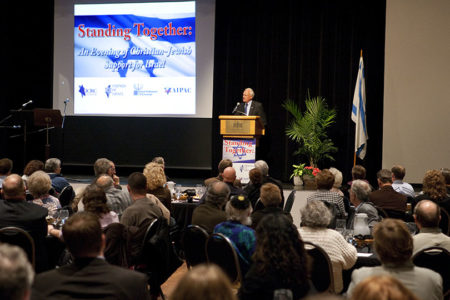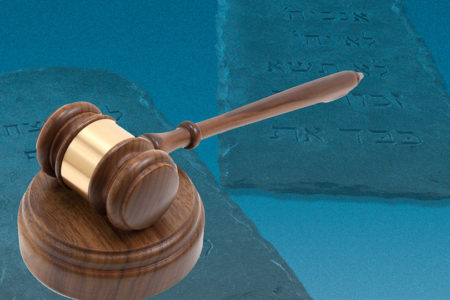Faith at Jericho Hebrews 11:30–31
After 400 years in Egyptian captivity, the Israelites prepared to enter the Promised Land. The Lord commanded Moses to send one representative from each of the 12 tribes to search out the land of Canaan. Ten of the spies returned with a bad report and plunged the nation into sin: “We are not able to go up against the people, for they are stronger than we…and we were like grasshoppers in our own sight” (Num. 13:31 33). Only Joshua and Caleb had faith in both God’s promise and power to deliver the land to Israel (14:6 8).
The Lord pardoned Israel’s sin of unbelief, but He made the nation wander 40 years in the wilderness until the generation coming out of Egypt died (vv. 20 38). Only Caleb and Joshua survived.
Hebrews 11 says nothing of Israel’s wilderness wandering and jumps directly from the Red Sea crossing (v. 29) to the nation’s exercise of faith at Jericho (v. 30)—probably because Israel exhibited little faith during its 40 years in the desert.
A Commander’s Faith
Though Hebrews does not mention Joshua, he was a tower of faith in Israel’s odyssey. His character was impeccable, never marred by scandal or sin during the years he served the Lord under Moses. His life, in fact, is filled with lessons on how to live vigorously and victoriously by faith.
Joshua was selected to serve Moses as a leader during Israel’s wilderness wandering. He was with Moses on Mount Sinai (Ex. 24:13), and he faithfully submitted to Moses’ leadership until Moses died. Joshua was also a soldier, chosen by Moses to lead Israel in vanquishing the Amalekites (17:8 16). God chose Joshua to succeed Moses, and Moses charged Joshua to be a strong and courageous leader because God promised to use him to bring Israel into the Promised Land (Dt. 31:14, 23).
For the task, God gave Joshua supernatural skills, empowering him by filling him with the “spirit of wisdom” (34:9). Joshua implemented the spiritual strategy God gave him, waiting patiently until God parted the Jordan River so that Israel could cross into the land. Once there, he circumcised the men, kept the Passover, and received divine instructions from the Commander of the Lord’s army before invading Jericho (Josh. 5).
A Conquering Faith
Concerning Jericho’s destruction, Hebrews briefly states, “By faith the walls of Jericho fell down after they were encircled for seven days” (11:30).
Jericho is 853 feet below sea level. It is located four miles west of the Jordan River and is known as the City of Palm Trees. The many springs around Jericho make it ideal for habitation. In Joshua’s day, Jericho was considered a frontier town and the key city to the land of Canaan after crossing the Jordan River.
It was absolutely mandatory that Israel conquer Jericho if it were to take possession of the Promised Land. Humanly speaking, the city’s massive walls and heavily equipped army would have seemed invincible and immune to attack by an untrained horde of men who had spent 40 years wandering the Sinai Desert. But the real impediment to victory was spiritual: Would Israel put complete trust in God to provide it with the right plan, wisdom, and strength to conquer Jericho?
The story of the city’s fall under Joshua is described in Joshua 6. When the Israelites arrived they found Jericho securely shut up because it greatly feared Israel.
The Lord gave Israel a plan for conquering the city once the huge walls collapsed. He promised Joshua that He had given Jericho, its king, and its mighty men to Israel. All Israel had to do was exercise faith in God’s plan and be obedient to what He required of them.
So God instructed the Israelites to march around Jericho in silence once a day for six days. On the seventh day they were to march around the city seven times. On the seventh day, seven priests marched around Jericho before the Ark of the Covenant, with a shofar in hand. Then, at a given signal, the priests blew the shofar with one long blast. The people, who previously had been silent, shouted loudly; and the mighty walls of Jericho collapsed. Then the Israelites attacked the city and destroyed all the people, oxen, sheep, and donkeys (Josh. 6:1 5, 20 21).
The new generation was different from the one that came out of Egypt. It was full of faith, believing it could take Jericho. These Israelites put their future into God’s hands, and He honored their faith by giving them Jericho.
A Courageous Faith
With the stroke of his pen the author of Hebrews almost shocks us by including the story of a Jericho harlot named Rahab: “By faith the harlot Rahab did not perish with those who did not believe, when she had received the spies with peace” (Heb. 11:31).
Rahab’s faith manifested itself before Jericho’s destruction (Josh. 2). Before taking the city, Joshua sent two men there on a reconnaissance mission. They lodged at Rahab’s house, located on the city’s wall. When the king of Jericho heard they were there, he sent men to capture them. So Rahab quickly hid them under flax on her roof.
She admitted to the king’s emissary that the spies had come, but she also said they had already fled. After the spies promised that the Israelites would spare Rahab and her family after they conquered Jericho, Rahab helped the spies escape. She told them to hide in the mountains for three days until their pursuers gave up the search.
The men told Rahab to bring all her relatives into her house and to tie a scarlet cord in the window; she and all in her house would be spared. During the invasion, the spies kept their word: “And Joshua spared Rahab the harlot, her father’s household, and all that she had. So she dwells in Israel to this day, because she hid the messengers whom Joshua sent to spy out Jericho” (6:25).
Many people wonder how God could use a prostitute to accomplish His will. Some have suggested that Rahab was not actually a prostitute but an innkeeper or a hostess. However, the text clearly calls her a harlot. Rahab is not praised for what she was but for her great faith in God within a pagan culture. There also is no indication she continued her wicked life as a harlot after becoming identified with Israel.
It is hard to believe that a person like Rahab, an Amorite living in a totally pagan society apart from the covenant promises of Israel, could have exercised such great faith. Herein lies a supreme example of God’s mercy and grace. He is able to reach down and save the most unlikely person, even someone whom most people of faith would deem hopelessly lost.
Joshua 2 reveals that Rahab had knowledge of Jehovah God. She was well-informed concerning Israel’s recent history and miraculous deliverance from Egypt. How she heard the news of God’s grace, mercy, and mighty miracles is unknown. The important point is that she believed it. Rahab’s faith and belief in God, like Abraham before her, was imputed to her for righteousness.
A few examples of Rahab’s faith are recorded in Hebrews and Joshua. She “received the spies with peace” at the peril of her own life (Heb. 11:31). James wrote, “Likewise, was not Rahab the harlot also justified by works [meaning her works proved that she was a believer] when she received the messengers and sent them out another way?” (Jas. 2:25).
Rahab declared her faith when she used the word Lᴏʀᴅ (Josh. 2:9), meaning “Jehovah,” speaking of the one true God of Israel.
- She saw Jehovah as the personal God of Israel when she called Him “your God” (v. 11).
- She believed Jehovah who had given the Israelites the land (v. 9).
- She believed in God’s divine redemptive power that miraculously delivered Israel at the Red Sea and from two Amorite kings (v. 10).
- She believed Jehovah to be the only true God who ruled over “heaven above and on earth beneath” (v. 11).
- She believed God would spare and deliver her and her father’s household (vv. 12–13).
- She trusted the two spies and obediently followed their instructions (v. 21).
- She was steadfast in her faith, exhibiting full assurance that Israel would defeat and capture Jericho.
God protected Rahab because of her faith, and she “did not perish with those who did not believe” (Heb. 11:31). Her faith secured her a great reward and her family a place in Israel with the people of God (Josh. 6:25). She is included in the Messianic line of Jesus Christ: “Salmon begot Boaz by Rahab, Boaz begot Obed by Ruth, Obed begot Jesse, and Jesse begot David the king” (Mt. 1:5–6; cf. Ruth 4:21–22)—all in the lineage of Jesus Christ.
Both Israel’s victory over Jericho and Rahab’s deliverance prove God extends His mercy, grace, and salvation to anyone who exercises true faith in seeking Him.







This is for Brother David Levy.
I enjoyed reading your 2011 Faith at Jericho article. I also have your excellent book on the Tabernacle and Offerings in my library.
I am wondering if you think the Tent of Meeting mentioned in Exodus 33 where Moses and Joshua are located outside the camp during the crisis – was that tent used only on that occasion? Once the Tabernacle was constructed – did the other tent become redundant?
My wife and I visited Israel and Jordan several years ago with a group of other believers organized by Brian Good, Prince Edward Island, Canada.
Thanks.
Peter Ramsay